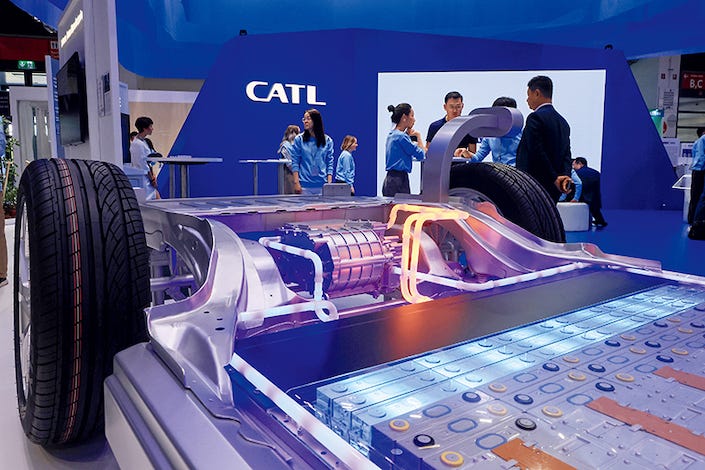Tech Insider: The Coming Battery Price War, Tencent’s Business AI
Chip industry chief talks up importance of China-U.S. ties, Gotion chooses Illinois for $2 billion battery factory
CATL introduced its newest superfast charging lithium iron phosphate battery Shenxing at the IAA car show in Munich, Germany, on Sept. 5. Photo: VCG
Welcome to Caixin’s Tech Insider, your twice-weekly wrap on the movers, shakers and deal-makers in China’s tech scene.
CATL and BYD gird for price war
China, the world’s biggest maker of electric vehicles (EVs), is poised to become a battleground for a price war between the two largest producers of the batteries that power EVs.
Contemporary Amperex Technology Co. Ltd., better known as CATL, holds 43% of the domestic market, while Warren Buffett-backed BYD Co. Ltd., which makes both electric cars and batteries, has about 30%. The next largest producer clings to less than 9% of the market.
BYD, boosted by demand for its own EVs, is quickly gaining on its bigger rival in batteries. For the first seven months of this year, CATL lost 5.1 percentage points of market share compared with all of 2022, while BYD gained 6.2 percentage points.
Just like the intense EV price war in China since January, many expect the two battery giants will eventually start a price war at some point when CATL can’t bear losing its No. 1 position to BYD.
For chip sector, China-U.S. ties are vital, industry chief says
China remains an important link in the global semiconductor supply chain and a vital market. The industry is eagerly hoping for relations between the world’s two largest economies to improve, according to the chief of a major U.S. chip industry group.
“Our biggest hope is that the governments can get to a better place where there’s less tension,” said John Neuffer, president and CEO of the Semiconductor Industry Association (SIA), during a Caixin interview in Beijing on Sept. 1.
“One of the secrets to the success of the semiconductor industry is the development of a global supply chain,” Neuffer said. “A country can try to have an end-to-end supply chain, but that supply chain won’t be very innovative, and it will be incredibly expensive.”
China AI race picks up as Tencent releases business-focused AI
Tencent Holdings Ltd. has debuted its general-purpose large language model (LLM) that it said can be the foundation of artificial intelligence (AI) applications geared towards companies, upping the ante in a race with domestic peers including Baidu, Alibaba and Huawei to develop the technology used to power tools like ChatGPT.
Unveiled Thursday, the LLM, dubbed Hunyuan, is available for enterprises in China to test and develop custom AI applications, according to a company statement. Its capabilities include conversation generation, Chinese language comprehension and creating images based on user prompts, it said.
Hunyuan marks the latest effort by Tencent to dip a toe into AI model development. In June, it launched its model-as-a-service solution targeting industries such as finance and education.
Battery-maker Gotion picks Illinois for $2 billion factory
A Chinese battery-maker has picked Illinois for a $2 billion gigafactory that’s set to kick off production next year.
Gotion High-tech Co. Ltd.’s facility, which will focus on lithium-ion battery cell, battery-pack production and energy storage systems, received state incentives valued at $536 million. The Chinese battery giant will also be eligible for $213 million in tax benefits over 30 years, as part of Illinois’s funding package.
The firm, which has Volkswagen AG as a major shareholder, will reuse an existing manufacturing site instead of building a new plant from scratch. The 150-acre facility, located south of Chicago, is expected to produce 10 gigawatt-hours (GWh) of lithium-ion battery packs and 40 GWh of lithium-ion battery cells.
EV startup’s revival hopes dashed as investor bails on rescue
Troubled Chinese EV startup WM Motor Holdings Ltd.’s hopes of a turnaround were dashed as a white knight investor bailed out of a $2.02 billion takeover.
Hong Kong-traded Apollo Future Mobility Group Ltd. Friday dropped its planned acquisition of WM and said a related share placement plan will no longer proceed.
The deal, announced in January, was seen as a survival move for embattled WM as it was intended to float the EV-maker in Hong Kong through a backdoor listing. A unit of Apollo, backed by tycoon Li Ka-shing, agreed to take over Shanghai-based WM for $2.02 billion.
Apollo cited multiple factors for canceling the acquisition, including financial market uncertainties, the weak post-pandemic recovery of China’s economy and geopolitical conflicts, according to an exchange filing.




